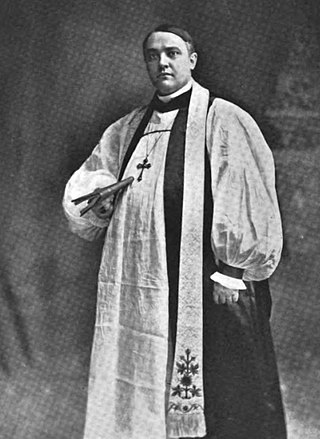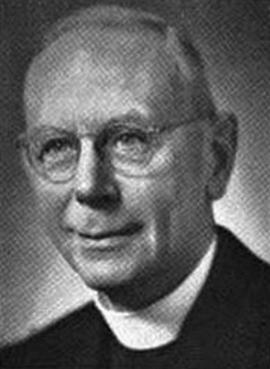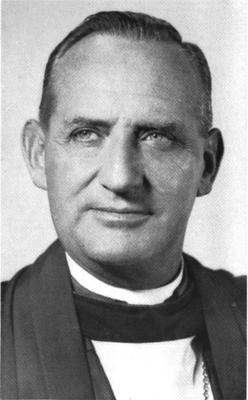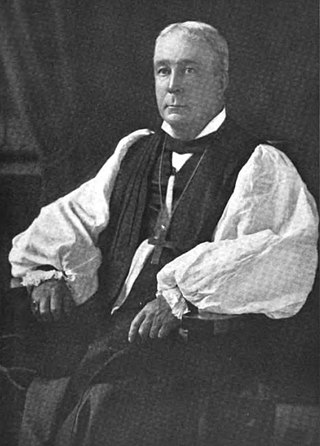Related Research Articles

Levi Silliman Ives was an American theologian and Episcopal bishop of North Carolina. In 1852, he converted to Roman Catholicism. Ives subsequently became a noted professor at colleges in the New York area. He was the founder and first president of the New York Catholic Protectory, an institution for the shelter and education of destitute and abandoned children. He was also a founder of Manhattan College.
Robert Rae "Bob" Spears Jr. was a prominent American prelate who served as Bishop of Rochester from 1970 to 1984.

Harry Sherman Longley was a 20th-century bishop in the Protestant Episcopal Church in the United States of America. He served the Diocese of Iowa as suffragan bishop from 1912–1917, coadjutor bishop from 1917–1929, and diocesan bishop from 1929-1943. Longley was the first suffragan and coadjutor bishop in Iowa, and the first bishop to resign the office. He is the only bishop of the diocese to serve in three positions.
Frank Elmer Wilson was an American bishop in the Episcopal Church. He was the first bishop of the Diocese of Eau Claire, serving from the creation of the diocese in 1928 until his death in 1944.
Harry Austin Pardue was the fourth bishop of the Episcopal Diocese of Pittsburgh. He served as diocesan bishop from 1944 to 1968. Although the Bishop never used the name during the many years of his ministry, his first name was actually "Harry".

Frederick Grandy Budlong was bishop of the Episcopal Diocese of Connecticut from 1934 to 1951. Born in Camden, New York, he died in Hartford, Connecticut.

Benjamin Martin Washburn was an American prelate who served as the fifth bishop of Newark in The Episcopal Church.
Walter Maydole Higley was bishop of the Episcopal Diocese of Central New York, serving from 1960 to 1969.

Harry Sherbourne Kennedy was a bishop of Hawaii in the Episcopal Church from 1944 till 1966.

Mahlon Norris Gilbert was coadjutor bishop of the Episcopal Diocese of Minnesota from 1886 to 1900 during the diocesan tenure of Henry Benjamin Whipple.

Thomas Augustus Fraser Jr. was eighth bishop of the Episcopal Diocese of North Carolina from 1965 to 1983.

Cameron Mann was the third bishop of North Dakota and the first bishop of South Florida in The Episcopal Church. He was the author of The Comments at the Cross: Six Lent Sermons.
George Moyer Alexander was fifth bishop of the Episcopal Diocese of Upper South Carolina, serving from 1973 to 1979.
Charles Bowen Persell Jr. was a suffragan bishop of the Episcopal Diocese of Albany, serving from 1963 to 1977. His son was William Persell, bishop of the Episcopal Diocese of Chicago from 1999 to 2008. He was an alumnus of the General Theological Seminary of the Episcopal Church.
Warren Lincoln Rogers was bishop of the Episcopal Diocese of Ohio from 1930 to 1938; he had served previously as coadjutor from 1925 to 1930. The Wa-Li-Ro Episcopal Choir Camp was named for him.
William S. Thomas Jr. was suffragan bishop of the Episcopal Diocese of Pittsburgh, serving from 1953 to 1971.
George William Davenport was the third bishop of the Episcopal Diocese of Easton, serving from 1920 to 1938.
John Durham Wing was the second bishop of the Diocese of South Florida in The Episcopal Church, serving from 1932 to 1950. He was elected bishop coadjutor in 1925.

David Lee Hicks is an American Anglican bishop. He was bishop coadjutor in the Diocese of the Northeast and Mid-Atlantic of the Reformed Episcopal Church, from 2005 to 2008 and served as bishop ordinary from 2008 to 2019. He had been also a bishop of the Anglican Church in North America, since the Reformed Episcopal Church was one of the founding bodies that joined at its inception, beginning in 2009. He also served as president and chancellor of the Reformed Episcopal Seminary as well as on various committees.
Harry Tunis Moore was the second bishop of Dallas in The Episcopal Church.
References
- ↑ "Episcopate: Bishop Mann Dies". The Living Church . 117 (21): 5–6. November 21, 1948.
- ↑ "Alexander Mann". Who's Who in the General Convention of the Episcopal Church, 1934: 62. 1934.
- ↑ "Alexander Mann". New Outlook. 81: 764. 1905.
- ↑ "Bishop Mann's Resignation". The Living Church . 106 (8): 25. February 21, 1943.